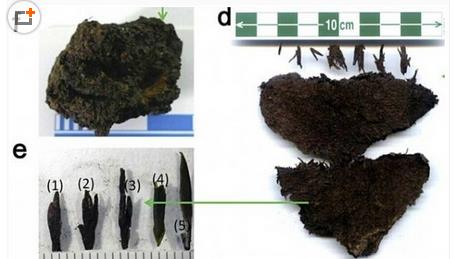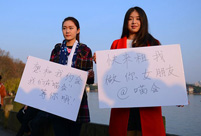

 |
| (Photo/China.com.cn) |
XI'AN, Jan. 14 -- Chinese archaeologists have discovered the world's oldest tea in the tomb of an emperor who ruled more than 2,100 years ago.
Excavation of the burial site of Emperor Jing of the Han Dynasty (202 BC-220 AD) in northwest China's Shaanxi Province began in 1998, but it has taken researchers from the Chinese Academy of Sciences until now to confirm that carbonized organic matter in the tomb was in fact tea.
They also found pottery figurines, bronze seals, rice and millet in the tomb, according to their research, published in Nature's online journal Scientific Reports last week.
Tea originated in China and was popularized during the Tang Dynasty (618-907), but this discovery proves it was being used by aristocrats much earlier than that.
Opinion is divided on the usage of tea in the Han Dynasty, said Yang Wuzhan, a research fellow with the Shaanxi provincial institute of archaeology. Some believe it was seen as a medicine rather than a drink.
 Charming female soldiers on Xisha Islands
Charming female soldiers on Xisha Islands Beautiful skiers wear shorts in snow
Beautiful skiers wear shorts in snow Getting close to the crew on China's aircraft carrier
Getting close to the crew on China's aircraft carrier A beauty's dancing youth
A beauty's dancing youth "Rent me as your girlfriend!"
"Rent me as your girlfriend!" Chinese stewardess celebrate test flight at Nansha Islands
Chinese stewardess celebrate test flight at Nansha Islands World's first 'underwater skyscraper'
World's first 'underwater skyscraper'  Top 10 weapons in the world in 2015
Top 10 weapons in the world in 2015 Are these the world’s scariest landing strips?
Are these the world’s scariest landing strips? Top 20 hottest women in the world in 2014
Top 20 hottest women in the world in 2014 Top 10 hardest languages to learn
Top 10 hardest languages to learn 10 Chinese female stars with most beautiful faces
10 Chinese female stars with most beautiful faces China’s Top 10 Unique Bridges, Highways and Roads
China’s Top 10 Unique Bridges, Highways and Roads Broadcast trial tests public’s legal awareness
Broadcast trial tests public’s legal awareness A look at the demographics of China’s movie-going population
A look at the demographics of China’s movie-going population Over 70% of young people find ways to watch porn despite crackdown survey
Over 70% of young people find ways to watch porn despite crackdown survey Leftists and rightists battle over how to interpret stories of China’s revolutionary past
Leftists and rightists battle over how to interpret stories of China’s revolutionary pastDay|Week